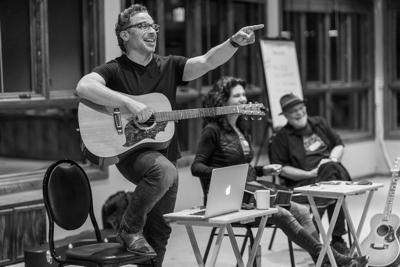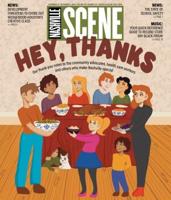
SongwritingWith:Soldiers music director Jay Clementi
Jessica Ridenour is a San Antonio, Texas,therapist and a U.S. Army veteran who served for 17 years. She is interested in creativity as a modality for her clients, so when she heard about Nashville-based nonprofit SongwritingWith:Soldiers, she was interested for professional as well as personal reasons. She thought the work they do might help with her healing for what she describes as “military sexual trauma and traumatic brain injury.”
“I’ve done all the antidepressants and all the regular talk therapy, and this was by far one of the best things that’s happened to help me recover from my own traumatic stress,” says Ridenour, who writes as Jessica Hope.
SongwritingWith:Soldiers organizes retreats for U.S. veterans from all conflicts at 16 locations nationwide. Since 2012, they’ve paired veterans and active-duty military with professional songwriters — including Beth Nielsen Chapman, Amy Speace, Radney Foster and others — to help veterans write about their experiences and their emotions. Veterans pay for their own transportation, but once they arrive, all expenses are covered. Because of that, and because of the healing that comes out of the experience, there’s a waiting list to participate.
In addition to helping veterans process what they experienced while serving, SongwritingWith:Soldiers also hopes to help bridge the gap between civilians and veterans in the U.S., improving understanding and providing support for returning service members.
Ridenour applied, was accepted and was paired with Denitia at her Tennessee retreat. The first night, everyone gathers in a room and collaboratively writes one song based on shared prompts given by a facilitator. At Ridenour’s retreat, that shared prompt was about gratitude, and Ridenour was surprised by how many common themes came up.
The next day, the veterans work one-on-one with songwriters to write their songs. They have less than three hours to do it. According to Jay Clementi, SongwritingWith:Soldiers’ music director and a professional songwriter with extensive credits, that can be an aggressive timeline.
“I was the most nervous for that,” says Ridenour. “I knew that’s when we could get into the roots of the trauma. I have testified in front of Congress, and I’ve been a part of changing laws. I was a senior military leader. I did want to talk about my personal suffering a little bit, but more, I wanted to talk about why I chose to become an advocate after that suffering.”
The result of Denitia and Ridenour’s work is “I Am Joy,” a song about “grace and grit” and choosing to “Get off your ass and do something / Make the world a better place.”
The benefits are not just anecdotal experiences. A small pilot study conducted by Harvard University and Massachusetts General Hospital found that the SongwritingWith:Soldiers process can reduce post-traumatic stress disorder by 33 percent and depressive symptoms by 25 percent.
In a long-term study the organization conducted with participants from 2012 to 2018, SongwritingWith:Soldiers found that 83 percent pursued additional creative activities after their experience and a full 100 percent of attendees would recommend the experience to other veterans.
Music director Clementi has had songs recorded by Dierks Bentley, Sara Evans, Martina McBride, Darius Rucker and others; he had a No. 1 hit on Billboard’s Country Airplay chart with Luke Bryan’s “Move.” He is very passionate about the organization’s work.
“I didn’t know how powerful and profound it was going to be in my life until I sat down across from a veteran, listening to them tell their story and just tried to put their words into a song,” Clementi says. “There’s just some amazing things that happen when you’re sitting with someone and trying to tell a piece of their story. It’s magic.”
If you’ve written as many songs as Clementi, you know there’s a professional filter. You know what topics you need to avoid, what themes have been repeated one too many times. You know not to drop an F-bomb. But at SongwritingWith:Soldiers, there are no filters, and that’s freeing.
“You’re kind of holding the paintbrush,” Clementi says. “You’re there, but they’re the paint.”
For her part, Ridenour says the process also helped her hear music differently. Now she thinks about word choice, chords and that process songwriters go through to articulate feelings and experiences for other people.
Since its inception in 2012, SongwritingWith:Soldiers has worked with more than 2,000 combat veterans — more than 1,000 in 2023 alone — building a catalog of more than 1,500 songs. Eminent songsmith Mary Gauthier included 11 of them on her 2018 album Rifles and Rosary Beads, which garnered a Grammy nomination. Clementi hopes more songs from the project will be released. But recording and studio time take money, and the nonprofit is focused for now on getting more veterans off the waiting list and into more retreats.






